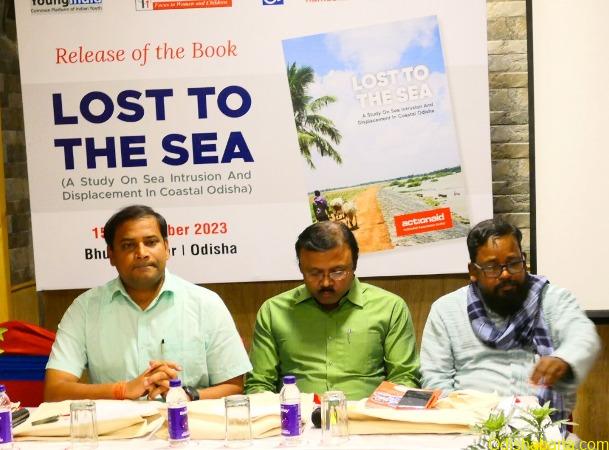Climate Crisis Unfolds in Odisha: Report Spotlights Rising Displacement and Urgent Policy Interventions

Bureau,Odishabarta

Bhubaneswar,16/11/23:ActionAid Association & its allies Young India, Sneha Abhiyan, Odisha Viklang Manch, Community Radio Namaskar released the report “Lost To The Sea”, a study on sea intrusion and displacement undertaken five most disaster-prone districts of Odisha viz; Ganjam, Puri, Jagatsinghpur, Kendrapara and Bhadrak. The study report was released by Mr. Tusharkanti Behera, Honourable Minister of Electronics & Information Technology, Sports & Youth Services, Home Government of Odisha along with Mr. Debabrat Patra, National Humanitarian Lead & Associate Director, ActionAid, Odisha; Mr. N A Shah Ansari, Founder President, Young India & Community Radio Namaskar; Mr. Ghasiram Panda, National Project Lead (Child Rights), ActionAid and community leaders from five study districts of Odisha.
The study covered 23 villages, 230 structured interviews across the villages, along with group discussion for individual villages with groups with the participation of 10 to 30 individuals.
The sample size consisted of equal participation of men and women participants with age groups ranging between 25 to 82.
The Bagapatia resettlement colony is first rehabilitation colony in the country where Government of Odisha has resettled 571 families from seven costal villages of Kendrapara displaced due sea intrusion. Each of the households resettled in Bagpatia was given Rs 1.2 lakh and allotted 10 decimals of homestead land. The 400-year-old Maa Panchu Barahi temple, earlier in Satabhaya, was shifted in 2018 to the Bagapatia rehabilitation colony. A composite government school from classes one to ten with 679 students has been functioning. Piped water supply has been provided for 571 rehabilitated households by constructing an overhead tank. The government has constructed a bituminous fair-weather road as the border and 19 internal roads. A multipurpose cyclone shelter has been constructed by the Odisha State Disaster Management Authority (OSDMA), which has been viewed as very useful by residents. More than 90 per cent of the households in the colony now rely completely on wage labour from migration for income as traditional livelihood bases have eroded with displacement. Local wage labour and small businesses are other sources of work, but available to very few households. The workforce is primarily male members from 18 to 45 years of age. Women don’t have access to any income source or livelihood besides animal husbandry. In the process of rehabilitation, people have been shifted to new places because of which they have lost access to many resources which were available to them free for years. In the original location, people had access to common property resources and other natural resources like land, water, and forests.
Satabhaya is only one example of the villages lost to the sea, leaving behind communities to find new homes and ways to survive. It is the tip of an iceberg of displacements that is unfolding due to the worsening climate crisis . ActionAid’s 2020 report ‘Costs of Climate Inaction: Displacement and Distressed Migration’ stated that India had 1.4 crore people internally displaced due to environmental disruptions and more than 4.5 crore people will be forced to migrate from their homes by 2050. Anthropogenic climate change has not only increased frequency and hazard intensity of rapid-onset events like cyclones, landslides, and storm surges, it has also made India highly prone to displacement due to slow-onset events like water stress, coastal and riverine erosion, continued crop failures and ecosystem loss. Distress migration and displacement caused due to such events can increase the already high levels of social and economic vulnerabilities as a large number of people might lose their habitual place of residence. Hence, policy interventions need to be proactive. Recognising the impending situation, a Private Member’s Bill was introduced in the Lok Sabha last year to establish an appropriate policy framework for the protection and rehabilitation of internally displaced climate migrants. A need for a participatory assessment framework which covers economic, social and psychological losses and damages is a first step for paving the way for a sensitive policy appreciation for designing resettlement and rehabilitation.
A feminist and rights lens to such an assessment would be crucial in building progressive futures.
A resettlement plan which is oblivious to visible and invisible losses that women and girls face due to displacements, let alone blind to the need for an equal future for them, will be a step backwards.
A framework of climate justice, which recognises that communities that have the smallest ecological footprint and have only served humanity as frontline ecology defenders, are the ones who suffer the most, so they must inform our thinking and action for compensation and rehabilitation. As per news reports, while the plan announced also includes provision of agricultural land to displaced households, it will be key for ensuring that a principle of land for land is observed on the basis of past land records, as also the promise of land to landless families in the resettlement plans.
What the Bagpatia model hopes to achieve is a beginning which needs to advance urgently. India, together with other countries of the Global South won a hard-fought victory at the COP’27 in Egypt in setting up an international fund for compensating climate induced losses and damages, and now it is imperative to create mechanisms for its implementation in the country. We stand at the cross-roads of an impending climate catastrophe. The policy decisions we take today will pave the way for the future course of our lives, livelihoods, and civilisation.
Ms. Mandakinee Kar, Chairperson, Odisha State Commission for Protection of Child Rights, Government of Odisha joined the programme and emphasized on the findings of the study related to the vulnerability of women and children.
Among other are Mr Suvendu Kumar Ray, Senior Project Lead, ActionAid , BN Durga, Swati Tanmaya Mishra, Amita Singh, Debabrat Mahunta, Ashim Amita Dash, Ranjita Dash from ActionAid were present in the meeting.






